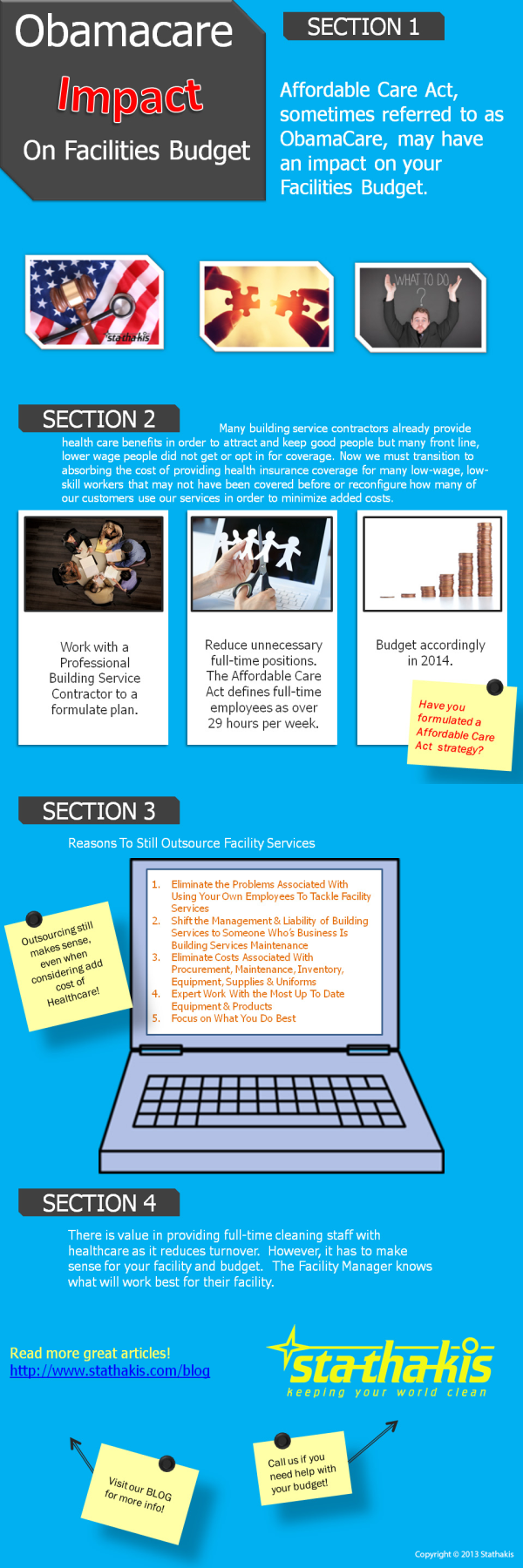 If you are a Facility’s Manager, you may be wondering how the PPACA (also referred to the Affordable Care Act, or ObamaCare), might impact your building services budgets. Many components of the PPACA were set to take effect over a stretch of time giving businesses a chance to formulate a compliance and implementation strategy, but 2014 is a big year for required changes. With your Building Services contractors facing the financial implications of complying with the new health care requirements, what will this mean for you?
If you are a Facility’s Manager, you may be wondering how the PPACA (also referred to the Affordable Care Act, or ObamaCare), might impact your building services budgets. Many components of the PPACA were set to take effect over a stretch of time giving businesses a chance to formulate a compliance and implementation strategy, but 2014 is a big year for required changes. With your Building Services contractors facing the financial implications of complying with the new health care requirements, what will this mean for you?
The hope of the PPACA was to make it both required and simplified for small and medium sized businesses to provide health insurance for all full time employees. Whether you support universal health care or not, the reality is that the Affordable Care Act is here to stay. Our job now is to formulate a strategy to mitigate the immediate impact of added health coverage costs. Many building service contractors already provide health care benefits in order to attract and keep good people but many front line, lower wage people did not get or opt in for coverage. Now we must transition to absorbing the cost of providing health insurance coverage for many low-wage, low-skill workers that may not have been covered before or reconfigure how many of our customers use our services in order to minimize added costs.
VIDEO ON HEALTHCARE REFORM & THE FACILITIES BUDGET
Under the Affordable Care Act, many building services contractors will be penalized if they fail to provide full-time employees with the chance to enroll in an eligible employer-sponsored plan. Full-time employees are quantified as those working thirty plus hours per week. Under the Employer Shared Responsibility provision, employers that fail to provide the opportunity to enroll in coverage are subject to financial penalties. Likewise, employees that are given enrollment opportunities but opt out are also penalized with the goal being to manage costs and avoid the over use of the expensive ER service often frequented by the uninsured.
The bad news is there is a concrete, increased financial cost for building services contractors and the cost of this real and significant financial burden in providing insurance for all employees will ultimately result in an added cost that Facility Managers will have to absorb much of. The good news is that Massachusetts, where Mitt Romney implemented very similar health care reforms, has weathered the changes without the catastrophic losses to small businesses and unemployment many have predicted. Massachusetts is the only real-time example we have of the long range effects of health care reform and many businesses are looking to this example to see how to adjust to the financial pressures of s many changes.
 Chris Stathakis CEO of Stathakis, a Michigan Building Services contractor had this to say about the Affordable Care Act and upcoming changes to health insurance costs for companies like his, “Will it hurt? Probably. Will we all have to make adjustments to how we price and value building services? Certainly. Will we all weather the new mandates for universal health care? I think we will.”
Chris Stathakis CEO of Stathakis, a Michigan Building Services contractor had this to say about the Affordable Care Act and upcoming changes to health insurance costs for companies like his, “Will it hurt? Probably. Will we all have to make adjustments to how we price and value building services? Certainly. Will we all weather the new mandates for universal health care? I think we will.”
Since many Facility Managers are working on their 2014 budgets now, it is wise to consider the impact of the Affordable Care Act, which will go into full swing on January 1st, 2014. So how is this likely to impact your Building Services Budget? There are several variables that will effect how your budget may be impacted, some of which you have control over. Here at Stathakis, we are committed to working on a plan individually with our customers to comply with and mitigate the costs of the new mandate where possible.
The first variable is how many hours per week employees work in your building. To qualify to receive mandatory Heath Insurance per the Affordable Care Act employees must work more than 30 hours per week. If you really don't require full-time employees and are all right with part-time or multiple part time people, you might not be looking at an increase in next year's Building Service’s Budget.
While there is not an exact cost on how much mandatory health insurance will ultimately cost businesses, preliminary estimates are putting a price on basic insurance of $2-$3 per hour, or about $4,160 to $6,240 per year, per full-time employee. It is important that Facility managers understand that any price it increases coming their way are strictly in response to the healthcare mandate. At Stathakis, we understand facilities managers are already under tremendous pressure to keep their budgets in line and any price increase we instituted are directly related to employee healthcare costs.
Whether you experience some price increases in your Building Service’s budgets or not, there are still significant advantages to outsourcing your building services, including:
- Eliminate the Problems Associated With Using Your Own Employees To Tackle Facility Services
- Shift the Management & Liability of Building Services to Someone Who’s Business Is Building Services Maintenance
- Eliminate Costs Associated With Procurement, Maintenance, Inventory, Equipment, Supplies & Uniforms
- Expert Work With the Most Up To Date Equipment & Products
- Focus on What You Do Best
The best strategy in controlling Health care costs for your building next year is to work closely with your Building Services Contractor. They should be educated on how the Affordable Care Act will impact their business and ultimately you. They should have some strategies in place to help you control health care cost and estimate how it will impact your budget.




Leave a Reply